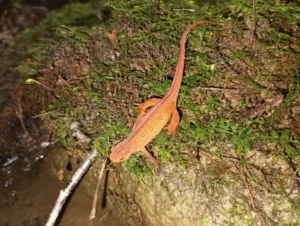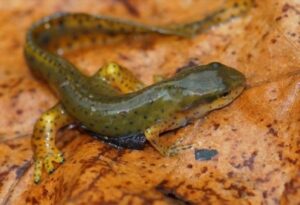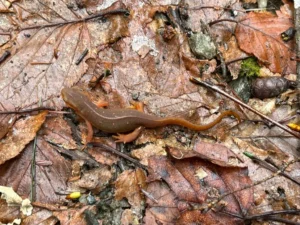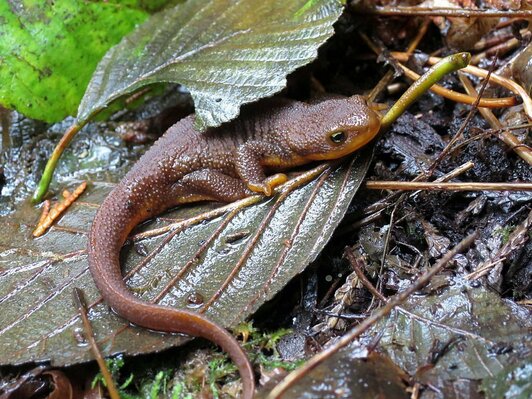You’re walking by a pond in the evening and notice a little newt moving slowly along the water’s edge. You might wonder, why now? Why not during the day?
Newts are mostly more active at night. They’re crepuscular and nocturnal, which just means they move around in the evening, at night, and in the early morning. Doing this keeps them safe from predators, avoids the heat, and helps them find food like worms, insects, and slugs.
Why Do Newts Stick to the Dark?
Predators like birds and bigger mammals are out mostly in the day. By staying hidden until evening, newts have a much better chance of not being eaten.

The dark works like a natural shield. Their soft, moist skin blends in with wet soil, leaves, or pond water.
For a small animal that needs to stay hidden, night is the safest time.
Do Newts Come Out in the Day?
Sometimes they do. After rain or on cloudy days, you might see newts even when the sun is out.
Moisture is very important for their skin, and wet conditions stop them from drying out.
So even though they usually prefer night, a rainy morning or cool afternoon can bring them out.
If you’ve ever seen a bright red eft (a young newt) crawling on a misty trail in the day, that’s why.
Hunting Works Better at Night
What do newts eat? Mostly insects, worms, slugs, and tiny water creatures. Lots of these are active at night too.
A newt moving in the dark can find prey wriggling in the soil, floating in the water, or crawling on plants.
Their slow, steady hunting works best when food is close by, and nighttime gives them plenty of that.
How Seasons Change When They Are Active
Newts don’t stick to the same routine all year. In spring and summer, when nights are warmer, they’re more likely to move around after dark.

In cooler months, they slow down, and during winter in colder areas, they might hide underground or underwater, barely moving at all.
So, are they more active at night? Mostly, yes, but it can change a bit depending on the time of year.
Why Moisture Matters More Than Time of Day
For newts, it’s not really the clock, it’s how wet it is. Their skin can dry out easily. Night usually brings cooler, wetter air, which makes it safer to explore.
But right after a heavy rain, even the daytime can be perfect. That’s why people often see newts or salamanders crawling across roads or paths on rainy afternoons.
So it’s not just night they like, it’s damp conditions that let them move safely.
Do All Newts Act the Same?
Not exactly. Different species do things a little differently.
Eastern newts in North America often come out at dusk and stay active at night.

Smooth newts in Europe do the same, especially in breeding season when they’re hanging out in ponds more.
Bright red efts (the land stage of the Eastern newt) can show up during the day because their bright color warns predators they’re toxic.
Still, most newts are safer and more comfortable moving in the dark.
What Happens in Ponds at Night?
If you shine a light into a quiet pond after dark, you’ll see more than just ripples. Newts swim slowly, looking for food, and males might even show off to attract mates.
Nighttime ponds are busy. Insects land on the water, worms crawl along the edges, and small fish stir. For a newt, it’s the perfect time to be awake.
Why We Rarely See Newts in the Day
Newts are actually more common than people think, but they’re secretive. Their night habits make them hard to spot.
During the day, they hide under logs, stones, or leaves, resting in damp, shaded spots.
Unless you flip a rock or look closely at the pond edges, you probably won’t notice them.
That’s part of the fun, seeing one feels special because they’re usually hidden.
How Newts Compare to Salamanders
You might wonder if salamanders do the same thing. They do, most are also nocturnal or crepuscular.
Like newts, they need moisture and safety, and the night gives them both.
That’s why people often confuse newts and salamanders, they share a lot of habits, including moving mostly at night.
Conclusion
Yes, newts are more active at night. They use the dark to hide from predators, hunt for food, and protect their delicate skin from drying out.
While they can show up on wet or rainy days, most of their quiet, secret life happens under the cover of night.
Next time you wonder where newts are during the day, remember: they’re just waiting for evening, when it cools down and gets quiet, and it’s finally their time.
Hi, my name is Ezra Mushala, i have been interested animals all my life. I am the main author and editor here at snakeinformer.com.

